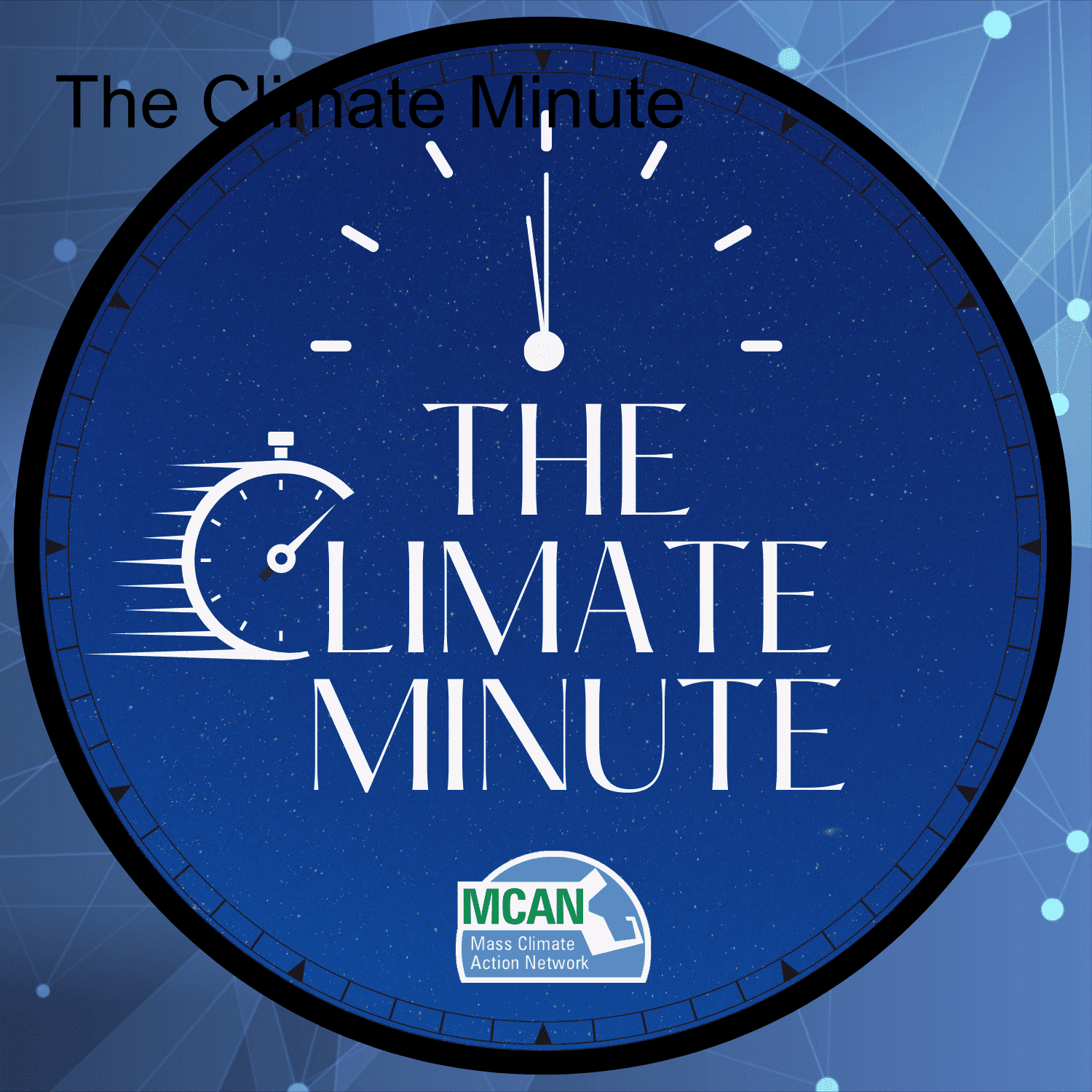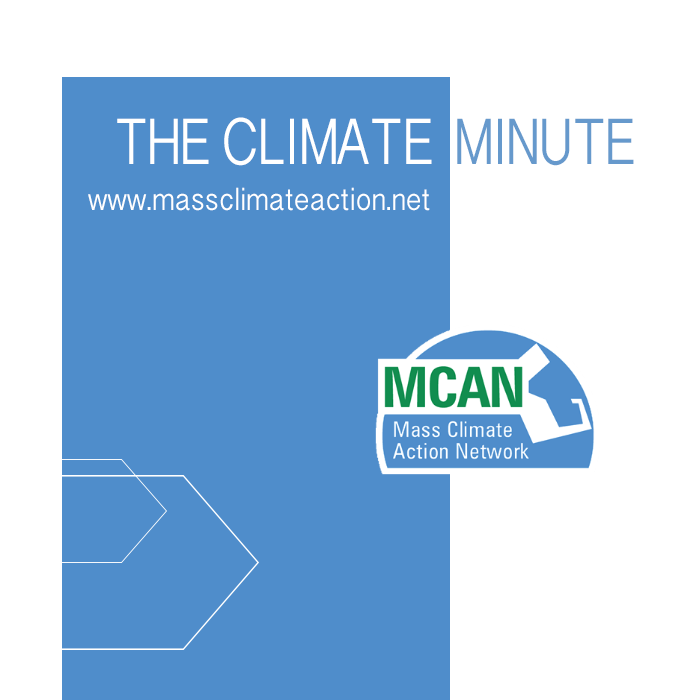
768.5K
Downloads
995
Episodes
The Climate Minute examines current news on global warming, climate change, renewable energy and the prospects for progress on international negotiations, carbon taxes and clean energy policy.
The Climate Minute examines current news on global warming, climate change, renewable energy and the prospects for progress on international negotiations, carbon taxes and clean energy policy.
Episodes

Friday Jul 21, 2017
The Golden State is green: The Climate Minute Podcast
Friday Jul 21, 2017
Friday Jul 21, 2017
California passes an extension to its landmark Cap and Trade policy, cementing the states leadership role in setting climate policy in the post-truth era. On top of that individual areas of the state have sued oil companies for damages. We discuss the implications, and wonder if our court system is already compromised by the partisanship of our times.

Tuesday Jul 18, 2017
Twenty five corporate scoundrels: The Climate Minute Podcast
Tuesday Jul 18, 2017
Tuesday Jul 18, 2017
This week we have three main topics: the CDP Worldwide (formerly the Carbon Disclosure Project) report that twenty-five fossil fuel companies are responsible for over half of the carbon pollution in the air since 1988; the actions that utilities are taking against renewable energy; and the 200th anniversary of the birth of Henry David Thoreau.

Friday Jul 14, 2017
The unintentional promotion of despair: The Climate Minute Podcast
Friday Jul 14, 2017
Friday Jul 14, 2017
This week we focus on a story in New York Magazine about the extremes of climate change and the media backlash to the article. Ironically, the story came out the same week as an ice sheet the size of Delaware calved off of Antarctica—a topic for another week!
On July 9, 2017, David Wallace-Wells penned a controversial article, “The Uninhabitable Earth,” for the New York Magazine. “The Uninhabitable Earth,” is a horror story of what terrors climate change will bring to us. The piece sums up Al Gore’s line about “a nature hike through the Book of Revelation.” Wallis-Wells based his article on the direst predictions from the Intergovernmental Panel on Climate Change—the 8C rise in temperatures—presenting the bleakest possible scenario for global warming outcomes. A scan of Wallace-Wells headings provides the flavor of the article—Doomsday: Peering Beyond Scientific Reticence, Heat-Death: the Bahraining of New York, The End of Food: Paying for cornfields in the tundra, Climate Plagues: What happens when the bubonic ice melts?, and Perpetual War: The violence baked into heat. The theme and the tone of the piece suggest that Wallis-Wise believes that human destruction is the direction that we are going. It leaves little room for hope, which sent the cyber-world into a flurry of criticism. Across the board, the critiques of the article say that it is well-written, but inaccurate and works against the cause of climate action. Michael Mann, Professor of Meteorology and one of the scientists behind the hockey stick graph depicting the sharp temperature rise in recent decades, provided the most poignant eviscerations of the article. According to Mann, some specific areas of concern in the article are the exaggeration of the methane feedback loops (melting creates more methane that leads to more melting, which releases more methane and so forth), the misinterpretation of a dataset that was corrected and showed “data showing the globe warming…more than twice as fast as scientists had thought” when, in fact, the dataset had initially shown lower warming and the correction put it in line with all of the other datasets; and the extraordinary claims with little supporting evidence.
An article such as “The Uninhabitable Earth” places into the hand of climate deniers the perfect foil to scientists’ carefully researched and documented writings. It is only a matter of time before Breitbart, The Daily Caller, and similar media forces grab it and say look how alarmist and hysterical these tree-huggers are. We have to keep in mind the asymmetry of the media, particularly how certain sources will cherry-pick the inaccuracies in “The Uninhabitable Earth” to depict an alarmist agenda based on incorrect facts. Wallace-Wells’ article plays directly into that rhetoric due to poorly sourced data, lack of citations, hyperbolic claims, and sloppy research; these mistakes overshadow his discussion of key and actual effects that he presents.
An additional problem with the article is that when you suggest that we are past the point of no return, you spiral the human brain into despair. Fear may be a strong motivator in the immediate term, but it is a lousy long-term motivator. Responding to a threat that is insurmountable, as Wallace-Wells puts forth on climate change, may put people in an intellectual paralysis, believing that there is nothing they can do to stop the train. So they will keep polluting and curtail efforts to curb greenhouse gas emissions. People need to rage, rage against the dying light. The piece doesn’t hammer away at the fact that there are things we can do and technologies we have in our grasp that can keep us far away from this bleak vision of what the future is. This article focuses on the business-as-usual, do nothing scenario. We can still mitigate things and that is important to have in line with the presentation of alarm.
There is an upside to David Wallace-Wells article—it has engendered a flurry of discussion surrounding climate change again, such as we saw when Trump disavowed the United States participation in the Paris Climate Agreement; prior to these two occasions, climate change did not make the regular hot topic of the nightly news list. And perhaps this article will serve as a glass of ice water on the face to wake up folks who aren’t inclined to confront the ultimate grim consequences of climate change. We give Wallace-Wells credit for sparking this conversation and creating some teachable moments.
July 12th marked the fifth anniversary of Bill McKibben’s article, “Global Warming’s Terrifying New Math” featured in Rolling Stone Magazine. That was a piece that inspired the first People’s Climate March in New York. Wallace-Wells article attempted to do something similar. He was trying to say that climate action needs to be number one on the list of issues we care about—what Scott Pruitt is doing to the planet is far more dangerous than what Vladimir Putin is doing. But we can’t help but contrast Wallace-Wells’ messaging approach with Al Gore’s. Have you ever heard Gore present anything that could be construed as despair? Never. Because the moment that you start implying it is a hopeless situation, the bad guys win.
So please read the article but don’t give into the unintentional promotion of despair. Use it as a motivator for what we don’t want to happen to our world and raise your voice. Take Bob Marley’s advice, Get Up, Stand Up, Stand up for your rights…and don’t give up the fight!

Monday Jul 10, 2017
Baby, you can drive my EV! The Climate Minute Podcast
Monday Jul 10, 2017
Monday Jul 10, 2017
The G20 meeting this past week held discussions of the Paris Accord. The rapid arrival of attractive electric vehicles shows that markets are committed to clean energy (and hence the Paris Accord,) even if our orange furor is not. Listen in.

Friday Jul 07, 2017
Friday Jul 07, 2017
The courts have forced the EPA to follow the law. It said that a delay in enforcement of rules governing methane leaks was the same as a new rule. This means EPA must present real scientific data in order to change the Obama era rules. (Note to Scott- that may be harder than you think.) The court ruling has a lot of implications for other EPA plans.The EPA also is considering holding public evaluations of climate science (“red team/blue team” in the current language.) Sunlight and public discussion is good, but the approach here seems to be to attempt to legitimize the tiny fraction of opinion that holds climate science as suspect. Beware the smoke and confusion!

Monday Jul 03, 2017
Manage your google! The Climate Minute Podcast
Monday Jul 03, 2017
Monday Jul 03, 2017
We discuss the Pruitt EPA’s attempt to manage science, but end up discussing how climate information gets to your personal news stream. Knowledge is power. Listen in.

Friday Jun 30, 2017
Reading the leaves: The Climate Minute Podcast
Friday Jun 30, 2017
Friday Jun 30, 2017
This week we discuss phenology (whatever that is) Massachusetts polls and cool things to do with MCAN this summer. Listen in.

Monday Jun 26, 2017
Mariah Tinger on pioneers and heroes: The Climate Minute Podcast
Monday Jun 26, 2017
Monday Jun 26, 2017
This week, we interviewed Mariah Tinger, co-author of the book, Protecting the Planet: Environmental Champions from Conservation to Climate Change, winner of the Green Book Festival’s 2017 Best General Non-Fiction Book Award.
Climate change is often associated with predictions of dire calamities. But in the past, heroic individuals have stepped forward to meet even the most ominous ecological challenges. This book tells an inspirational story--a story both of pioneering environmentalists who raised our collective consciousness regarding nature's value and heroes of today who are working to secure a sustainable future.
In this father and daughter collaboration, Mariah Tinger and Budd Titlow tracked down fifty of the nation’s most interesting climate change experts and wrote Protecting the Planet: Environmental Champions from Conservation to Climate Change to illuminate featured heroes’ lives and work. The heroes’ stories include hate mail, death threats, jail sentences, venomous spider bites and fantastic adventure. They also tell of beautiful moments that inspired their passion, love that keeps them hopeful and the exciting new solutions that are on the horizon. The text is uplifting, inspiring and highlights what the reader can do to join the effort.
Protecting the Planet brings climate change to the public in a digestible and optimistic way, pulling readers in through the connection to people. Part of the book includes a study and presentation of the leadership characteristics of past environmental champions. In today’s podcast, Mariah highlights characteristics of persistence, singleness of purpose, and devotion to nature from some of the books heroes including Harriet Lawrence Hemenway, William Temple Hornaday, John James Audubon, Howard Clinton Zahniser, as well as contemporary heroes such as Bill McKibben and James Balog. We have much to be inspired by from these individuals who maintained hopefulness for environmental issues despite pushback, rejection, and political hurdles.
Tinger and Titlow’s book also includes comprehensive background on climate science and a section devoted to things we can all do as citizens for climate action. We highly recommend their book for your reading enjoyment and as an excellent reference for your home libraries.
Protecting the Planet: Environmental Champions from Conservation to Climate Change (Prometheus Books ISBN: 9781633882263) is available on Amazon in hardcover and eBook versions and can be ordered through all major booksellers as well.

Friday Jun 23, 2017
What kind of nation do you want? The Climate Minute Podcast
Friday Jun 23, 2017
Friday Jun 23, 2017
How should a Climate Hawk deal with the madness of our times? Listen

Tuesday Jun 20, 2017
Pruitt lies, but cities rise: The Climate Minute Podcast
Tuesday Jun 20, 2017
Tuesday Jun 20, 2017
Scott Pruitt twists the truth, misusing statistics to suggests a growth in coal jobs. But cities like Pittsburg are leading the way in fighting for clean energy. Listen in!
